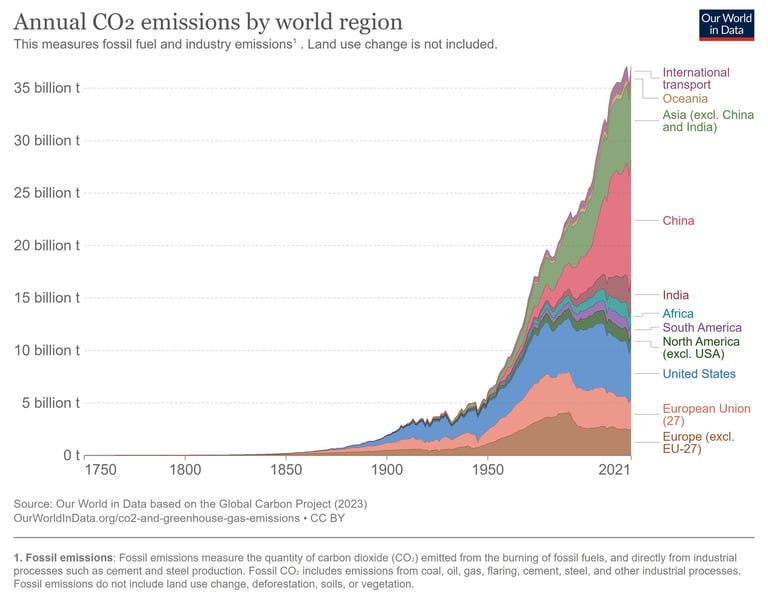Is 'Climate Change' even a problem?
The causes of Climate Change and Global Warming are not (just) human related
GUIDES AND TIPS
Greenly World
5/26/20235 min leer
In recent years the words 'Climate Change' has been frequently used especially in the news and media, and usually it has been negatively associated with our planet, because it is believed to hurt us and especially for coming generations. Climate change, in other words is expressed as a new phenomenon which has only been occurring since the industrial evolution began, therefore only linked to human activity. However, to fully understand the larger picture, we have to look at the history of the planet, and re evaluate which words to use when adressing sustainability, choosing eco friendly products and cleaner energy for the forecoming future. This will further be discussed in the following:
Table of contents:
- Introduction
- Climate change
- Geological Evidence
- Natural Factors
- Adaption and Long Term Climate Trends
- The real problem(s)
- Summary
Introduction:
In contrast to many beliefs, climate change is indeed a natural phenomenon that has occured throughout the history of our planet. That's why it is important to understant that it's not a new phenomeno, but rather an ongoing process, that has been happening for millions of years. Why is that? We'll list some reasons to why it has always existed on earth.
Geological Evidence:
Scientists within the geological fields have studied rocks, ice cores, and other geological records, and have detected evidence of earlier climate changes prior to the industrial revolution. How they have come to this conclusion is by their records that have demonstrated fluctuation in temperatures, rising sea levels that occurred way before human influence, and atmospheric compostion.
Natural Factors:
Other factors that impact climate change is various nautral factors such as solar radiation, activity of volcanos, and the orbital cycles of the Earth, and all these, can make significant changes in climate patterns over long periods of time. Next on the list is linked with the one just presented
Earth's Dynamic Systems:
Our planet is much more complex with many interconnected parts, such as the oceans, land, biosphere, atmosphere and biosphere. One change in one area can have enormous effects on others, which ultimately can lead to climate variations, aka Climate Change!
Ice Ages and Interglacias:
You've probably heard of the word of Ice Age before, or maybe even seen the famous infamous movie(s), where we follow Manny (mammoth), Diego (sabel tooth tiger) and Sid (sloth), through an ice cold age, where most of the planet had an average temperature of (6-8°C), 43 - 46 °F.
Our planet, has been through cycles of ice ages and interglacial periods for millions of years, where the last one occurred around 20 000 years ago. These natural cycles do make large changes in global temperatures and ice coverage. At the moment, the global average temperature are around 14 °C or 57 °F, which may not seem as a big difference from the last age, but it really is, especially on a global level.
Adaption and Prolonged Climate Trends:
All species, including animals and plants have been able to adapt to the ever changing climate conditions, which has demonstrated the resilience and ability of life on Earth to survive in different climate environments. So when looking at the climate data, our past shows trends of changing warming/cooling periods. Therefore, we can confidently say that Climate Change is not just a recent phenomenon, but something that has been part of our planets history.
The real problem(s):
You may think, well if climate change is a natural part of Earth's being, why so much focus on mitigating or adressing this isssue? We've survived so far so what's the big deal? Well, this is where things need more content, and where the recent changes over the last 200 years have been dramatically increased, starting from the industrial evoluton. Burning fossil fuels has lead to dramatically increased green house gas emissions, aka (GHG emissions). GHG emissions are gases that release into the Earth's atmosphere and leads to greenhouse effects, such as trapping heat and contribute to an increase in global temperatures. The most notable ones include carbon dioxide (CO2), methane (CH4), nitrous oxide (N2O) and fluorinated gases. The one, which most most have heard about are the CO2 emissions, and could be because it is the most abundant greenhouse gas, and is the most emited greenhouse gas out of all them. However, the other ones may be less emitted, but cause a bigger issue, since they have a higher warming potential per unit of gas emitted.
CO2 emissions has often times been used as an indicator for GHG emissions, which is also seen on the following chart from ourworldindata.org. It demonstrates the accelerated increase of CO2, which especially took place when the first industrial evolution happened around the 1800's.
Consequenses of increased GHG emissions:
The consequenses of GHG emissions are according to the ourwoldindata.org among other sources, extreme weather events, for example floods, storms, droughts, heatwaves, disrupted crop growth, sea level rise and more. All these could have massively impact to the health of people, other species, and also ecological and economical damage.
Moreover, another direct problem with burning fossil fuels and GHGs are the huge amount of pollution, specifically air pollution, which have been responsible of an estimated 7 millions death globally. These are important factors to note and adress, since it points to why there needs to be a transition to cleaner energy, and why simply mentioning climate change can mislead, misinform, and even creating disinterest in making a change in their lifestyle, product choices etc. Additionally, there needs to be a change in the semantics or wording regarding climate change, so it does not cause misinformation, or disinterest/disbelief. We want to reduce air pollution, GHG emissions, and extreme weather conditions to ensure a better and healthier world. One way to do improve our world is lifestyle choices, if you're interested in knowing more, we've reviewed some eco friendly choices that all can benefit from. See our article here
Analogy:
You can think of Climate Change in a different way to understand how it can be understood neutrally. Let's take our bodies as an example. The body is a complicated system, where many things (cells, digestion etc) happen each second of our existence. Therefore it is very natural the body undergoes changes, fx weight fluctuations happen daily. If you get informed that weight fluctuations are negative, you may have some people who become sceptical for good reasons, since it is a naturally occurring phenomenon. However, extreme weight fluctuations are where the real problems occur, which can be caused by external things, such as exessive eating, or the opposite of eating very few calories, which can disrupt the hormones in the body and lead to severe diseases, and ultimately a cause of death. If you think of it in this way, it makes more sense why we don't want extreme changes in our climate, which can lead to the bigger problems as earlier mentioned. The contexts is therefore very important for better understanding!
Summary:
Climate change is very real
Climate change by burning fossil fuels, has accelerated the phenomenon
The word 'Climate Change' can be misleading, and we have to use other more clearer or direct terms related with burning fossil fuels
The real problem(s) which are indirectly related to Climate Change, are increased GHG emissions, air pollution, pollution, among others
Geological Society of America - (https://www.geosociety.org/)
National Snow and Ice Data Center - (https://nsidc.org/)
NASA - Solar Variability and Climate - (https://climate.nasa.gov/evidence/#causes)
National Oceanic and Atmospheric Administration (NOAA) - Milankovitch Cycles - (https://www.noaa.gov/education/resource-collections/climate-education-resources/middle-school/climate-change-lp-2)
Intergovernmental Panel on Climate Change (IPCC) - Physical Science Basis - (https://www.ipcc.ch/report/ar6/wg1/)
National Center for Atmospheric Research (NCAR) - Land-Atmosphere Interactions - (https://www2.ucar.edu/atmosnews/news/10189/drought-and-heat-waves-bring-same-vicious-cycle)
National Oceanic and Atmospheric Administration (NOAA) - Climate.gov - (https://www.climate.gov/)
ScienceDirect - Evidence for Ice Ages - (https://www.sciencedirect.com/science/article/abs/pii/0012821X7890050X )
National Park Service - Ice Age Floods - (https://www.nps.gov/iceagefloods/index.htm)
National Geographic - Species Adaptation to Climate Change - (https://www.nationalgeographic.org/article/species-adaptation/)
University of California Museum of Paleontology - Climate and Ecosystems - (https://ucmp.berkeley.edu/climate/)
NOAA National Centers for Environmental Information - (https://www.ncei.noaa.gov/)
National Geographic - Historical Climate Patterns - (https://education.nationalgeographic.org/resource/resource-library-climate/)
Our worldindata.org - (https://ourworldindata.org/co2-and-greenhouse-gas-emissions)
Intergovernmental Panel on Climate Change (IPCC) - https://www.ipcc.ch/reports/


Contactos
greenlyworld@hotmail.com
¡Suscríbete a Nuestro Boletín para Obtener los Últimos Consejos sobre Eco-Amigabilidad y Salud!
